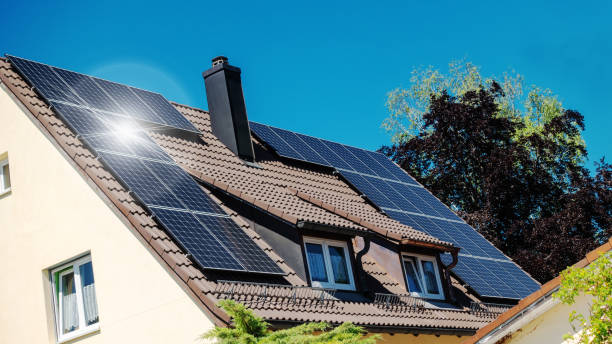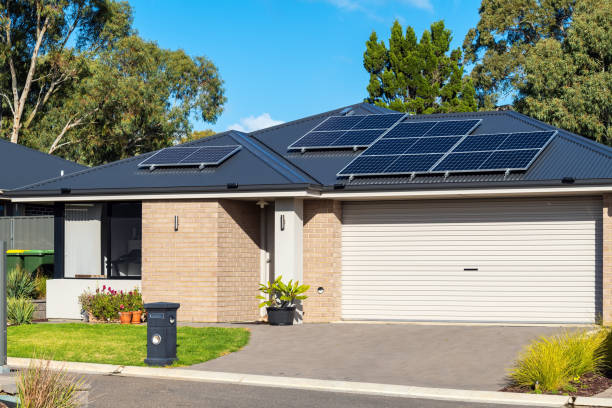The US is moving forward with solar power in a big way. In 2023, it’s anticipated that 4 million photovoltaic units will be installed, with Texas joining the front-runners in terms of installed PV units. In Texas, you might wonder if solar panels are worthwhile.?
As a state with a warm, sunny climate and some of the best solar tax incentives, Texas is theoretically the best location for solar panels. We’ll go over the advantages and disadvantages of solar panels in Texas because there are a few things to think about before deciding to go solar in this state.
How the Climate in Texas Affects Solar Energy Harnessing Possibilities
Due to the size of the state, Texas has a variety of climates. In the southeast of the state, it is subtropical, and along its coast, it is tropical. While the western mountain regions have an alpine climate, central Texas has a temperate climate. A semiarid climate prevails in the Panhandle region.
Pros of Solar Panels in Texas
Renewable Energy
Solar energy is essentially limitless and clean, in contrast to fossil fuels, which are limited and emit dangerous emissions. Solar panels function by capturing sunlight and converting it into electricity, which can then be used to power homes, other buildings, and even automobiles. Solar energy can even be used to warm water or produce steam.
Save Money on Electricity
The long-term savings and environmental advantages of solar energy make it a smart investment, despite the fact that solar panels in Texas (and elsewhere, of course) may initially cost more than other forms of energy. Your own electricity will be produced and used, saving you money on utility costs.
Even though your home has a solar energy system, if your electricity bill is still high, there may be something wrong with the system or another issue.
Protect Home from Outages
As they are not connected to the conventional power grid, solar panels will continue to produce electricity even if the power is out. As simple as that.
Cost-Effective
Texas has some of the highest electricity prices in the country, but solar power can significantly lower monthly expenses there. This state also provides a range of financial incentives for solar panel installation.
Nex Metering
The best solar incentives in Texas, as well as many other states, include net metering. It is a billing arrangement between utility customers and their electricity providers. Net metering in Texas enables qualified customers who generate their electricity from renewable sources to receive a credit on their electric bill for the excess power they produce because the state’s grid is unregulated. The cost of upcoming electricity consumption can be offset by consumers using this credit.

Federal Tax Incentive
By the end of the year, homeowners can claim a credit equal to 26% of the cost of installing solar panels under the federal solar tax credit for 2022 (Investment Tax Credit, or ITC). Incentives of 23% should be expected if you intend to install a solar panel system in 2023. Both newly constructed homes and existing homes are eligible for credit.
Property Tax Exemptions
Texas residents who put solar panels on their homes are eligible for a tax break equal to the solar system’s appraised value. This exemption covers both the price of installing solar panels and their purchase price for both commercial and residential properties. Both new construction and retrofit projects must adhere to it.
Solar Rights Law
This law prevents homeowners associations from forbidding solar panels on their properties. You can therefore install a residential solar system in Texas without being restricted by HOA rules.
Closer to Energy Independence
People look for ways to contribute to the effort being made by our nation to achieve energy independence and lessen climate damage. Recycling and composting can help, but increasing the use of solar energy can have a significant impact, in addition to lowering your own carbon footprint.
Reduced Carbon Footprint
A smaller carbon footprint is one of many advantages of having solar panels on your roof, though it is not the only one. Without releasing harmful emissions into the atmosphere, solar energy enables you to produce energy. Solar energy is also pure and free of greenhouse gases.
Cons of Solar Panels in Texas
Not the Best for Every Home
Even though Texas is one of the sunniest states in the US, not every home receives the same amount of sunlight. Solar panels, for instance, may not be as effective in homes in northern Texas as they are in southern Texas due to differences in sunlight exposure. In addition, your home must meet a number of other requirements for solar panels to produce enough power to eventually enable you to go off the grid.
However, there are some issues you can quickly resolve, such as the potential solar panel inefficiency brought on by the home’s location in the shade. Study up on the potential solutions.
Upfront Cost
In Texas, the average cost to install a solar panel is between $11,432 and $15,468. Before federal tax credits and other financing options, this means that the average price of solar panels in Texas is only about $2.69 per watt.
Naturally, the price to install solar panels in Texas varies based on things like monthly electricity usage, the kind and brand of solar panels, how many peak sunlight hours there are, and the number of solar panels. Please feel free to view the cost estimates using the Texas solar panel cost calculator.
Although it’s safe to say that Texas’s upfront costs for going solar have decreased, for many homeowners they may still be prohibitive.
Payback Time
Solar panels typically require 12 years to pay for themselves. Again, to some, it might seem like an interminable period of time. But hey, Energy Sage estimates that after 20 years, you will have saved more than $16,000.

Maintenance Cost
Solar panels don’t cost a lot to maintain, but if they aren’t taken care of properly, they could end up being ineffective or even permanently broken, costing you more money in the long run. The panels might also need to be changed every few years.
A 2kW system with ten panels will cost, on average, between $300 and $700 to inspect and clean on a national level. That is what you can expect to pay for maintenance on your solar system.
No SRECs in Texas
SRECs, or Solar Renewable Energy Certificates, are a way to financially commend homeowners for installing solar panels. This encourages the use of solar power so that domestic consumers nationwide rely less on coal for energy. SREC availability, however, is state-dependent. According to SRECTrade, Texas “does not currently have a viable SREC market because there is no exemption for solar.”
Not Compatible With Every Roof
You should make sure that your roof receives enough sunlight for the solar panels to absorb if you intend to install solar panels there. Solar panels can be mounted on any kind of roof, but they perform best when they are angled at 30 degrees toward the south or southwest. You might not get the best results for your roof if the angles of your roof face east and west.
Summary
Property owners in Texas are becoming more and more knowledgeable about the advantages of solar energy and the potential for utilizing it. Solar panels can significantly reduce energy costs given the high electricity costs in the state. Texas also offers a number of tax breaks and rebate programs in addition to other incentives for solar panel installation.
Is solar energy worth the cost? It will cost you more money upfront to install solar panels than other forms of power. A state like Texas, where the sun shines brightly all year round, makes them particularly worthwhile to invest in due to the long-term savings.
FAQs
How Much Can You Save With Solar Panels in Texas?
In Texas, the average household spends about $1,801 on electricity annually, but solar panels can cut that cost by as much as $960.
Can You Get Solar for Free in Texas?
Unfortunately, Texas does not offer free solar panels. The installation of solar panels can, however, be done for free or at a greatly reduced cost thanks to a number of programs that are currently in place. While utility companies provide some of these programs, the state government offers others.
Do Solar Panels Add Value to a House in Texas?
Solar panels are frequently regarded as an advantageous addition to a house. A study by the Lawrence Berkeley National Laboratory discovered that a properly installed solar system could boost a home’s value by up to $15,000 in total. Solar panels could, however, lower the value of the house if they are not installed properly.
